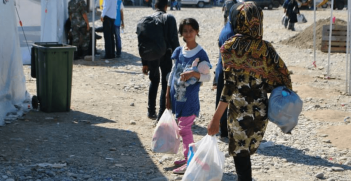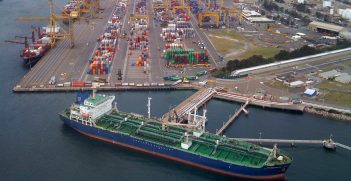Australia Must Halt all Military Exports to Saudi Arabia

By continuing to export arms to Saudi Arabia, Australia is complicit in the regime’s violations of human rights.
Australia has been exporting military equipment and intelligence to Saudi Arabia for many years despite the highly controversial nature of these sales. If Australia is to uphold its publicly stated intention to protect and promote the international rules-based-order, the Government must hold the Saudi Arabian monarchy to account for its human rights atrocities and halt all military exports to the kingdom.
The exporting relationship is contentious, as Saudi Arabia has been leading a coalition of nations in the Yemeni Civil War which has seen the death of 10 000 civilians, and reports of the murder of journalist Jamal Khashoggi point to the involvement of the Saudi Crown Prince Mohammed bin Salman. Vehement opposition to the exports has come from prominent civil society groups Human Rights Watch and Amnesty International, which have publicly criticised these military sales.
Determining the full extent of Australia’s military export relationship with Saudi Arabia is a difficult task. The government will not reveal the types or quantities of arms and equipment that have been sold, citing “commercial-in-confidence rules”. However, we do know that 10 licenses for military exports from Australia were granted in 2017, and four have been granted so far this year. Moreover, at the Land Forces Conference in September, Defence Minister Christopher Pyne announced intentions to develop a memorandum of understanding with the Saudi government to increase Australia’s arms sales. Concerningly, during Senate Estimates in October, defence officials could not guarantee that Australian arms aren’t being used in the conflict in Yemen, stating that defence sales “will contribute to the capability of a military force and will often contribute to a conflict.”
The war in Yemen began in 2014, and since then countless Saudi-led Coalition airstrikes have indiscriminately killed thousands of civilians, including children, as well as intentionally targeted civilian infrastructure such as school buses, hospitals and markets. Nearly two thirds of the Yemeni population require medical assistance and the medical non-for-profit Médecins Sans Frontières has raised particular concern with the Saudi government’s contravention of international humanitarian law by repeatedly bombing hospitals and emergency rooms.
Adding to concerns about the Gulf Kingdom’s actions in Yemen, is the murder of Jamal Khashoggi in October that took place in the Saudi Consulate in Istanbul, Turkey. Khashoggi’s murder is the most recent development driving the international pressure to call military trade deals with the Saudis into question. Turkish officials indicate that Khashoggi’s death was a planned and premeditated murder ordered at the highest levels of the Saudi royal family, contrasting to the Saudi government’s claim that he died unexpectedly as the result of a fist-fight. Khashoggi was a prominent Saudi journalist who often spoke out against the policies of Crown Prince Mohammed bin Salman, and his death has provoked international outrage.
Germany and Norway have already ceased arms sales to Saudi Arabia following the killing of Jamal Khashoggi, and Belgium took the same action in July this year citing human rights concerns about the Yemeni conflict as motivation. The trio are urging other countries to do the same and in the wake of Mr Khashoggi’s murder, they have been held up as an example by which the rest of the international community should follow.
Somewhat promisingly, in the Senate Estimates Foreign Minister Marise Payne revealed that “All options are on the table,” regarding Australia’s potential actions against the Saudi Kingdom for the Saudi Consulate murder. Payne said that she has spoken to other countries including the German government concerning the Saudi allegations and affirmed that the Australian government would wait until the results of the investigation come to light before considering decisive action.
That the halting of military exports to Saudi Arabia has not been ruled out is a positive sign. However, considering that Australian weapon exports are possibly being used for mass human rights violations in Yemen, the exports should be stopped regardless of the outcome of the Khashoggi investigation. Further, Australia is a signatory to the Arms Trade Treaty, necessitating that the Government block any arms deals where there is evidence that the weapons may contribute to attacks against civilians. Considering that the Department of Defence has not publicly ensured compliance with the obligations of this treaty, shifting the responsibility for ensuring treaty compliance onto the Department of Foreign Affairs and Trade during Senate Estimates, the Australian public should wonder to what extent their government is complicit in prolonging the bloody conflict in Yemen.
Encouragingly, Foreign Minister Payne has said that Australia’s views concerning the murder of Khashoggi have been conveyed to Riyadh, and further she stated that the concerning situation in Yemen has been a part of the Australian government’s consideration about the relationship with Saudi Arabia “for some time.” Whilst these are positive steps, it is important that Australia back-up rhetoric with action, halting arms sales to the Kingdom in order to send the message that Australia will no longer overlook Saudi Arabia’s significant human rights abuses. It is imperative that Australia follow the lead of countries such as Germany, placing the rule of law and respect for the international order above monetary gains and supporting their statements of “concern” with decisive leadership.
Dayna Santana is a Master of Peace and Conflict Studies student at the University of Sydney, and an intern with the Australian Institute of International Affairs.
This article is published under a Creative Commons Licence and may be republished with attribution.





